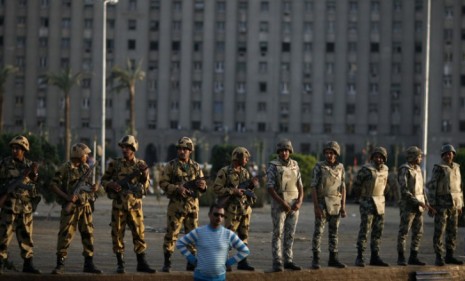Egypt's 'revolting' forced 'virginity tests'
The African nation's new military regime comes under fire after an Egyptian general admits that female protesters were subjected to degrading exams

A free daily email with the biggest news stories of the day – and the best features from TheWeek.com
You are now subscribed
Your newsletter sign-up was successful
Egypt's military forced at least 17 women to undergo "virginity tests" after they were arrested in the wake of a March 9 protest in Cairo's Tahrir Square, an unidentified senior general told CNN on Tuesday. The anonymous general's announcement fired up Egypt's pro-democracy movement, prompting a day of online protests and calls for an investigation. (Egypt's ruling military council has officially denied the charges, which were also raised earlier by Amnesty International.) What are these tests, and why does Egypt's military care about women's sexual status? Here, a brief guide:
What exactly is a "virginity test"?
Presumably, says Xeni Jardin at Boing Boing, it involves a "forcible examination of the hymen." One detainee, Salwa Hosseini, says she and the other 16 women were tied up, slapped, shocked with a stun gun, and called prostitutes, then strip-searched and forced to undergo the virginity exam by a man in a white coat — while soldiers watched. Not only are such "virginity checks" degrading and "revolting," says Jardin, but "examining the hymen is not an accurate way to determine virginity. This is a myth."
The Week
Escape your echo chamber. Get the facts behind the news, plus analysis from multiple perspectives.

Sign up for The Week's Free Newsletters
From our morning news briefing to a weekly Good News Newsletter, get the best of The Week delivered directly to your inbox.
From our morning news briefing to a weekly Good News Newsletter, get the best of The Week delivered directly to your inbox.
What is Egypt's supposed justification?
The senior general explained to CNN that the military wanted to protect itself against accusations by the women that soldiers "had sexually assaulted or raped them, so we wanted to prove that they weren't virgins in the first place." And "none of them were," he added. "The girls who were detained were not like your daughter or mine.... These were girls who had camped out in tents with male protesters in Tahrir Square."
Does anyone find that argument persuasive?
It probably "carries some resonance in Egypt's conservative society, where the idea that unmarried women would spend the night with strangers — albeit in public — [implies]... that the women were loose," says the AP. Of course, western commentators are slamming the general's "utterly perverse" rationale. The idea that only virgins can be rape victims is a "legal absurdity," says Amnesty International. His "comments are so ridiculous," says Rachael Larimore at Slate, "it's hard to think of something to say in response that isn't head-pounding-against-the-desk obvious."
A free daily email with the biggest news stories of the day – and the best features from TheWeek.com
What does this tell us about Egypt's push for democracy?
These abuses happened almost a month after Hosni Mubarak's ouster, under the military's rule, so "it looks like concerns over a new regime's attitude toward woman are unfortunately justified," says Slate's Larimore. New regime, old regime — this is hardly the first time "Egyptian authorities have used sexual intimidation against female protesters," says Joseph Mayton at Bikya Masr. The only way for Egypt to move past its "deep-rooted history" of sexual violence is to face it head-on.
Sources: CNN, AP, Slate, Daily Star, Boing Boing, New York, Bikya Masr, Amnesty International (2)